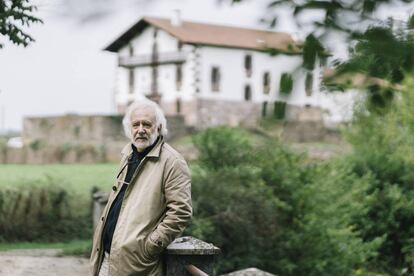The writer Arturo Pérez-Reverte, in 2006.
Gathered at the Antiguo Instituto de Gijón, the jury for the Critics Award, promoted by the Spanish Association of Literary Critics, has decided to recognize this year the academic and writer Arturo Pérez-Reverte (Cartagena, 69 years old) for
Line of fire
(Alfaguara ), his novel about the tragic battle of the Ebro. The award also has a lyrical category, which has been won by Ramón Andrés (Pamplona, 1955) for his collection of poems
Los trees that remain
(Hiperión).
Tsunami
, by Albert Pijoan, and
Semper és tard,
by Josep María Escrivá, have been the winners in Catalan.
O libro da filla
, by Inma López Silva, and
A desvertebra
, by Ana Romaní, in Galician. The Basque has also been represented by Pello Lizarralde and Jon Gerediaga, authors of
Argiantza
and
Natura Berriak
respectively.
In his award-winning book, Pérez-Reverte tells of the Republican conquest and the subsequent loss to rebel hands of a small town located between Mequinenza and Fayón, very close to the Ebro river. There is no such town (Castellets del Segre), but it could well exist: The story pivots on its control and loss, in order to detail the plurality of political factions that each party contributed to perfect the massacre. Each subgroup of one side — the legionaries, the Falangists, and the Moorish Guard — or the other — communists, anarchists, and Trotskyists — parade through these pages.
The president of the jury, Fernando Valls, highlighted the quality of all the works and the relevance of the winners in Spanish: “They are two very different authors and we liked both works very much. We do not usually reward works like Pérez Reverte's, so well known, but this time we loved it and we thought it deserved it ―he declared to this newspaper after the announcement of the concession―. Within everything that has been written about the Spanish Civil War,
Line of fire
stands out for the plurality of voices that it contributes.
It shows the horror of the battle from the human aspect, with characters that are sometimes on one side or another by chance, all very well told.
It is not equidistant, since the narration starts from the legality of the Republic, but the Francoists do not appear as monsters either.
In short, we think that it is a complex, plural and multiple novel ”.
Ramón Andrés, in Elizondo (Navarra), in September 2020. ALEX ITURRALDE
Regarding the award to Ramón Andrés, its main defender in the jury has been the critic Ángel Luis Prieto, who defines
The Trees that remain
as a short, succinct book, but one that contains the soul of the author. "An extraordinary approach to the world of nature, with a refined, felt and naked language", says Prieto. “Curiously, Ramón Andrés is not considered a poet from the start, since he has published many more works of other genres, but the truth is that all of them are crossed by a poetic spirit. Whether he writes about music, about the history of suicide or a compendium of aphorisms, everything is impregnated with poetry ”, he adds.
In addition to his poetry books, Ramón Andrés has published numerous reference essays, including one on the composer Johann Sebastian Bach, a dictionary of musical instruments or a history of suicide in the West. In summer he released
Philosophy and Consolation of Music
(Cliff), a 1,164-page treatise on the history of “thinking transformed into music,” as its author described it in an interview with this newspaper, from the pre-Socratics to the Enlightenment.
Andrés conceived
The trees that remain
after publishing that resounding reference work: “I needed to do a mental exercise of rest. I bought a folding chair and planted it under an oak tree. There, from May to December of last year, I wrote those verses, from happiness and healing. They staunch me, I was exhausted ”. The author has been living in a town in the Baztán Valley (Navarra) for a three-year period and received the news of the award right there: "I was pleasantly surprised, I did not contemplate it as a possibility."
The Spanish Association of Literary Critics (AECL) has granted these awards since 1956, the year in which Camilo José Cela received it for
La catira.
Since then, it has been received by figures such as Gonzalo Torrente Ballester, Miguel Delibes, Rafael Sánchez Ferlosio, Vicente Aleixandre, Blas de Otero, Francisco Brines and José Hierro. In the last edition, which should have been held in April in Malaga and was postponed to September due to the pandemic, the winners were the Argentine narrator Mariana Enriquez and the Spanish poet Juan Antonio González Iglesias for
Nuestra parte de noche
and
Jardín Gulbenkian
, respectively.



/cloudfront-eu-central-1.images.arcpublishing.com/prisa/ZHBM2UJTXJEMFAJJLPXP2OGBRQ.jpg)



/cloudfront-eu-central-1.images.arcpublishing.com/prisa/B2WWUHAVNEZLHAZZPKOWRCSUEE.jpg)







